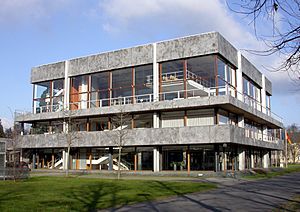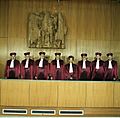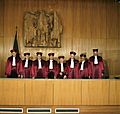Bundesverfassungsgericht facts for kids
The Bundesverfassungsgericht (say: Boon-des-fair-fass-ungs-ge-richt) is Germany's most important court for its Constitution. It is often called the Federal Constitutional Court. This court does not handle regular criminal cases. Instead, it makes sure that all laws and government actions follow Germany's main rulebook, called the Basic Law or Constitution.
The court is located in the city of Karlsruhe. This location was chosen to show that the court is independent. It is separate from the main federal government, which was first based in Bonn. It is also separate from other federal groups like the German intelligence service (BND).
Contents
What Does the Court Do?
The court's powers and how it works are set out in German law. The Constitution (Article 20.3 of the Grundgesetz) says that all parts of the government must follow the Constitution. This includes the parliament, the government ministers, and other courts. The Federal Constitutional Court can decide if actions by any of these groups do not follow the Constitution. If they don't, the court can stop them.
Why the Court Might Stop a Law
The court might find something unconstitutional for different reasons:
- Breaking the Rules: This happens if a law or action was not made in the correct way. For example, if the government did something it wasn't allowed to do by the Constitution. Or if it didn't follow the right steps when making a law.
- Ignoring Rights: This means a law or action might be allowed in one way, but it ignores another part of the Constitution. For instance, it might ignore the civil rights that are protected in the Grundgesetz.
- An example of this happened when the government wanted to let the air force shoot down hijacked planes. The court stopped this law. It decided that the right to life of the people on board was more important.
The court's decisions about these "material conflicts" are put into action through a special law called the Federal Constitutional Court Act.
Types of Cases the Court Hears
The court only hears certain kinds of cases:
- Constitutional Complaint: Anyone can ask the court to check if their constitutional rights have been violated. Many important decisions by the court have come from these complaints. Some major laws, especially about taxes, have been changed because of these cases.
- Checking Laws: If a regular court is hearing a case and thinks a law might be unconstitutional, it can ask the Federal Constitutional Court to check. If the law is fine, the regular court can continue its case.
- Disputes Between Government Parts: Different parts of the federal government, including members of the Bundestag (Germany's parliament), can ask the court to settle disagreements about their powers.
- Disputes Between States and Federal Government: The German Länder (states) can ask the court to decide if they or the federal government have the right to do something. They can also ask if something is being done correctly.
- Checking Election Results: Any government group or voter involved can ask the court to check if a federal election was run fairly.
- Removing Officials: If the Bundestag, the Bundesrat (another part of parliament), or the federal government believes the President or a judge has broken the Constitution, the court decides if they should be removed from their job.
- Banning a Political Party: Only this court can ban a political party. This has happened only twice in Germany's history. Both times were in the 1950s. In 2003, a third attempt to ban a party failed. The court found that many officials of the party were actually controlled by German secret services. So, the court decided not to continue the case.
How the Court is Organized
The court has 16 judges. They are split into two groups, called senates. Each senate has eight judges. The head of one senate is also the President of the entire court. The head of the other senate is the Vice President.
Most cases are first heard by a smaller group of three judges from one senate, called a "chamber." All three judges in this chamber must agree on a decision. A chamber must follow decisions made in the past (called precedent). If a chamber thinks a past decision should be changed, the whole senate must decide the case. If one senate thinks a past decision by the other senate should be changed, then all 16 judges meet together to decide. This meeting is called the "Plenum."
Decisions by a senate usually need at least 5 out of 8 votes. For some special cases, 6 out of 8 votes are needed. A special law decides which types of cases each senate hears.
How Judges Are Chosen
Judges for the Federal Constitutional Court are chosen carefully. Four judges for each senate are chosen by the Bundestag. The other four are chosen by the Bundesrat. To choose a judge, at least two-thirds of the votes are needed.
Judges serve for 12 years. However, they must retire when they turn 68 years old. A judge must be at least 40 years old and be a well-trained lawyer. Three out of eight judges in each senate must have been a judge in one of Germany's other top federal courts. The other five judges often include professors of law from universities, public servants, or lawyers.
After their term ends, most judges retire from public life. One famous example was Roman Herzog. He was elected Federal President in 1994, shortly after finishing his time as President of the Court.
Images for kids
See also
 In Spanish: Tribunal Constitucional Federal de Alemania para niños
In Spanish: Tribunal Constitucional Federal de Alemania para niños
 | Victor J. Glover |
 | Yvonne Cagle |
 | Jeanette Epps |
 | Bernard A. Harris Jr. |






